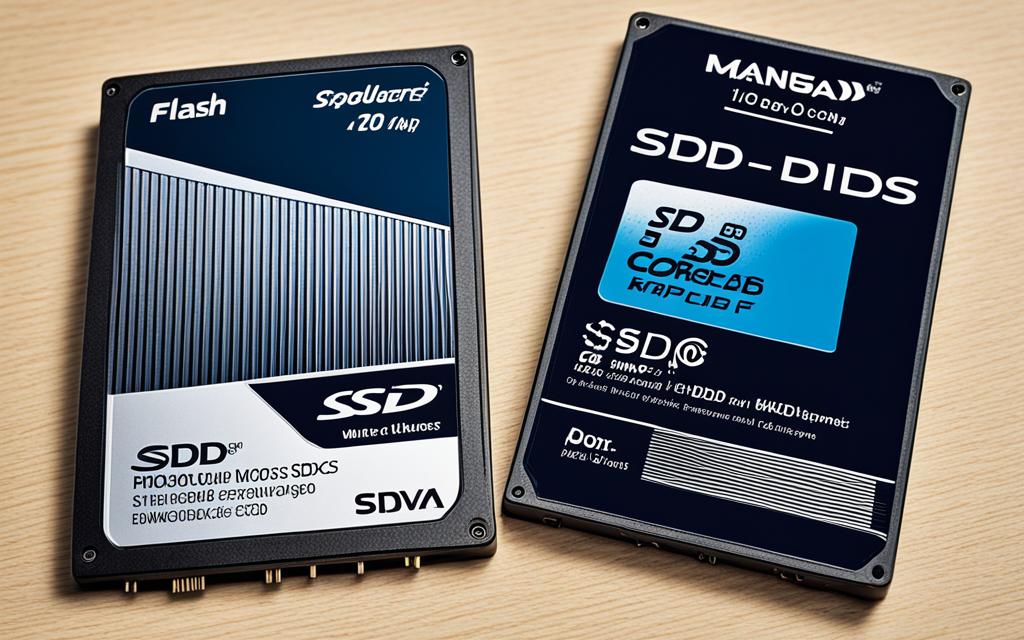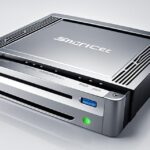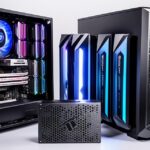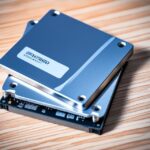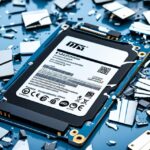Table of Contents
When it comes to storing data, knowing how SSDs and HDDs differ is crucial. Technology is always changing. This has sparked a big debate on whether SSDs or HDDs are better. SSDs can quickly access data, with speeds from 500 MBps to 3,500 MBps1. In contrast, HDDs move data much slower, at 30–150 MBps.
Understanding how each one works helps people and companies make smart choices. They can pick the best option for either personal use or big professional projects. Now, more and more people prefer SSDs. They choose them for their lightweight laptops, gaming computers, and desktops. This is because SSDs are faster and more reliable2.
Key Takeaways
- SSDs offer significantly faster data transfer speeds compared to HDDs.
- HDDs generally provide larger storage capacities at a lower cost.
- Durability and energy efficiency are key advantages of SSDs.
- Understanding your specific needs can help you choose the right storage solution.
- Mixing SSDs and HDDs in a system can optimise performance and capacity.
Introduction to Storage Devices
Storage devices are key in today’s computing world. They let us save and get back data easily. This introduction to storage devices talks about two main kinds: Hard Disk Drives (HDDs) and Solid State Drives (SSDs). HDDs and SSDs are different but both hold data. HDDs have moving parts and can store a lot of data, more than 18 terabytes. The first HDDs could only hold 3.75 megabytes3.
SSDs, on the other hand, use chips for memory. This makes them much faster at getting to data. You can find SSDs in sizes from 128 GB to 2 TB. The biggest ones, like Samsung and Toshiba’s 30.72 TB drives, came out in 20183. HDDs are cheaper for storing lots of data4. But SSDs are quicker and use less power.
Choosing between HDDs and SSDs depends on what you need. Do you want a lot of storage or to get to your data quickly? Each choice has its own set of pros and cons. Once we know what we need, we can look into how each one fits into our digital world.
| Storage Type | Average Capacity | Cost per GB | Speed | Energy Efficiency |
|---|---|---|---|---|
| HDD | 250 GB – 18 TB | 0.03 USD | Longer | Less efficient |
| SSD | 128 GB – 32 TB | Higher than HDD | Faster | More efficient |
The Fundamentals of HDD Technology
Understanding HDD technology is crucial for grasping basic data storage principles. Hard Disk Drives (HDDs) use spinning magnetic platters for storage. They work with a read/write head that moves over the disks to access or save data. As the disks spin, the actuator arm moves the head to the right track. This process has some latency. This makes HDDs a budget-friendly choice for those needing more space without spending much.
How HDDs Work
HDDs rely on physical parts like spinning platters and mechanical arms. Magnetic fields are created when data is stored, marking where it goes. The time it takes for the actuator arm to reach the correct track affects the HDD’s latency. This is key for understanding the pros and cons of HDDs.
Advantages of HDDs
HDDs offer many benefits to various users. Their main advantages are:
- Cost-effectiveness: They provide more storage for less money, making them ideal for big storage needs.
- Larger storage capacities: HDDs can store much more data than many SSDs, offering several terabytes.
- Durability for archival storage: Despite being prone to damage, they are often used for storing data for a long time.
Disadvantages of HDDs
HDDs also have downsides that might affect their use. Their main disadvantages are:
- Slower data access speeds: They are slower than SSDs, which can be a drawback for demanding tasks.
- Vulnerability to physical shock: HDDs can get damaged by impacts more easily, risking data loss.
The Rise of SSD Technology
The arrival of SSD technology has changed how we store data, offering major improvements over older HDD tech. SSDs use flash memory, allowing for quicker data access without needing moving parts. This leads to vastly better performance. For example, SSDs can be over 20,000% faster in random reads than top HDDs5. Even basic SSDs from Kingston are ten times quicker than traditional HDDs. This means getting to your files and programs much faster5.
How SSDs Operate
SSDs use NAND flash memory for storing data electronically. This differs from HDDs, which rely on spinning disks. SSDs get to data almost immediately, greatly improving how we use computers. The usual SATA SSDs reach speeds around 500 MB per second. But the newer NVMe SSDs can hit 3,000 to 3,500 MB per second6. A jaw-dropping difference is shown in copying a 20 GB movie: less than ten seconds for SSDs, compared to over two minutes with HDDs6.
Advantages of SSDs
SSDs shine with their incredible speed, being far quicker than HDDs in reading data. For example, they offer up to 56 times faster sequential reading and 226 times faster at 4K read tasks6. They’re also more reliable because they have no moving parts. This makes them tougher and can last over a decade, outdoing HDDs that average five years6.
Disadvantages of SSDs
However, SSDs weren’t always perfect. They used to be more expensive than HDDs. But as production grew and technology improved, prices fell5. Data recovery can be pricier with SSDs due to their complex tech6. The TRIM feature in SSDs, which erases data when deleting files, complicates recovering lost files more than with HDDs6.
Performance Comparison: Speed and Efficiency
When we look at performance analysis SSD vs HDD, speed stands out. SSDs are much quicker than HDDs. For instance, SSDs can move files at 500 MBps or more. In contrast, HDDs usually reach up to 30–150 MBps7. This shows that SSDs, using flash memory, allow faster access to data. This leads to quicker starting times for your computer and better performance for your apps7.
Speed of Data Access
SSDs don’t just beat HDDs in speed; they also win in how many operations they can do per second. For example, SSDs can read data at small sizes at a speed of 1,075 IOPS. HDDs can only manage about 175 IOPS7. This difference explains why SSDs are the top choice for gaming or using big software, where loading quickly is key8.
Energy Consumption
SSDs also lead in using less power. They need less energy, so they don’t get as hot as HDDs. HDDs, with their moving parts, use more power and can make your system hotter8. SSDs help laptops last longer on a charge. They also run more quietly, making them a better choice for today’s computers.
Impact on Overall System Performance
SSDs make a big difference in how well your system works. They cut down the time it takes to start up and open apps8. This is great for gaming, work software, or just everyday tasks. The shift from HDD to SSD is happening because people want faster and more efficient storage. This change is becoming more common as the need for speed grows in our digital world.
FAQ
What is the main difference between SSDs and HDDs?
SSDs and HDDs differ in their technology. SSDs use flash memory, leading to quicker access to data. On the other hand, HDDs use spinning platters which slows down performance.
Are SSDs more reliable than HDDs?
Indeed, SSDs tend to be more reliable. This is because they don’t have moving parts. So, they’re better at handling shocks. HDDs, however, can get damaged if they’re hit or dropped.
Why are SSDs more expensive than HDDs?
SSDs cost more due to their flash memory technology. This technology speeds up data access. However, it requires a higher manufacturing cost than HDDs’ mechanical parts.
How does speed affect performance in daily use?
Speed makes a big difference in how we use our devices. With SSDs, everything from starting up to loading apps and moving files is quicker. This makes your device more efficient compared to using HDDs.
Can I use both SSDs and HDDs in the same system?
Definitely! It’s common to use SSDs for running the operating system and primary apps. HDDs are great for storing large files like backups and movies.
How does energy consumption compare between SSDs and HDDs?
SSDs use less power, which saves energy. This also means your device stays cooler. Keeping cool helps it run better for longer.
Is it possible to upgrade from HDD to SSD?
Absolutely! Many people switch from HDD to SSD for a speed boost. It’s a great way to make your computer faster and more responsive.
Source Links
- https://aws.amazon.com/compare/the-difference-between-ssd-hard-drive/ – SSD vs HDD – Difference Between Data Storage Devices – AWS
- https://www.pcmag.com/news/ssd-vs-hdd-whats-the-difference – SSD vs. HDD: What’s the Difference?
- https://www.ibm.com/think/topics/hard-disk-drive-vs-solid-state-drive – Hard Disk Drive (HDD) vs. Solid State Drive (SSD) | IBM
- https://www.geeksforgeeks.org/difference-between-hard-disk-drive-hdd-and-solid-state-drive-ssd/ – Difference between Hard Disk Drive (HDD) and Solid State Drive (SSD) – GeeksforGeeks
- https://www.kingston.com/en/blog/personal-storage/ssd-vs-hdd-differences – The Difference Between SSD and HDD- Kingston Technology
- https://www.avast.com/c-ssd-vs-hdd – SSD vs. HDD: Which Do You Need?
- https://www.diffen.com/difference/HDD_vs_SSD – HDD vs SSD – Difference and Comparison
- https://www.tomshardware.com/features/ssd-vs-hdd-hard-drive-difference/2 – SSD vs HDD Tested: What’s the Difference and Which Is Better?

